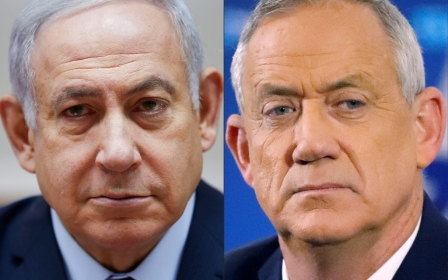World must fight back against Israeli annexation - whether formal or not

As Israel’s parliament swore in a new government this week, Prime Minister Benjamin Netanyahu reiterated his goal of annexing territory in the occupied West Bank. “It’s time to apply the Israeli law and write another glorious chapter in the history of Zionism,” he told the Knesset.
Ever since the deal between Netanyahu and Blue and White leader Benny Gantz took shape, including a commitment to advancing “sovereignty” in the parts of the West Bank allocated to Israel under the Trump administration’s plan, annexation has featured heavily in diplomacy and in analysts’ debates.
But amid all the discussion about potential consequences for Israeli relations with the EU or for the peace treaty with Jordan, not much attention has been paid to the possibility that annexation will ultimately be fudged.
'Everything but random'
As Haaretz correspondent Noa Landau has noted, a clause in the coalition agreement signed between Likud and the Gesher party states that the latter “pledges to support all the stances expressed by the prime minister that are coordinated with the United States and directly or indirectly linked to the issue of applying sovereignty” - ie, annexation of West Bank territory and settlements.
Perhaps, in the end, it will be something less than formal annexation - something that appears more ambiguous and confusing to the outside world
The wording here is "everything but random", Landau notes, “chosen by the best political wizards” to achieve “maximum ambiguity about Netanyahu’s intentions regarding West Bank annexation”. In other words, “even if Netanyahu decides to call off, delay or limit the annexation, Gesher is obligated to support him. All options are open”.
Perhaps, sometime after 1 July, Israel will indeed go ahead with the formal annexation of some 30 percent of the West Bank. But perhaps, in the end, it will be something less than formal annexation - something that appears more ambiguous and confusing to the outside world, or at least can be presented as such, but is still a sop to the settlers (and Trump’s evangelical right-wing base).
What if the mere prospect, or threat, of annexation serves to obfuscate a deepening of the facts on the ground, in the same way that speculation over the contents of Trump’s plan helped distract from the relentless pace of concrete measures signalling loud and clear that the target is the Palestinian national struggle?
De facto or de jure annexation
In her analysis of the Likud-Gusher clause, Landau points out that even if “Netanyahu delays and stalls the de jure annexation, de facto annexation has already happened on the ground”.
She continues: “Israel effectively operates in the settlements and in Area C - which is under full Israeli civil and security control - as if they were an inseparable part of Israel for a long time. So why not just continue to de facto annex while avoiding international drama that would be created by an official annexation? That way Netanyahu can have the cake and eat it too, exactly how he likes it.”
This approach goes far beyond Netanyahu, however; it has dominated Israeli strategic thinking since 1967. As I wrote in my book Cracks in the Wall, “the fact that, until now, the West Bank remains de facto, rather than de jure, annexed, is - paradoxically - one of the reasons why Israel has been able to advance its colonisation project so effectively”.
This is the advantageous situation that former Israeli military officials opposed to de jure annexation wish to maintain. One such group, the Commanders for Israel’s Security, has explicitly queried the wisdom of annexing territory “where we already enjoy freedom of military and civilian action”.
As Hagai El-Ad, director of Israeli human rights group Btselem, put it in a withering critique: “The Israelis don’t need annexation to continue successfully advancing, and at zero cost, the Israeli project on the backs of the Palestinians.”
The two-state mantra
For decades, a “peace process” has been used to dismiss calls for accountability - a shield under which Israel has steadily entrenched its de facto annexation of the West Bank.
Now, “preserving a two-state solution” could be the mantra that enables anything short of formal annexation to be welcomed with huge relief - yet another diversion as Israel expands settlements, fragments Palestinian territory, and enjoys all the fruits of annexation without the costs of doing so formally.
A fudged, or “modest” act of annexation carries its own additional risk - namely, that many people will be prepared to welcome, or justify and downplay, partial measures.
David Makovsky and Dennis Ross, both former State Department advisers, have urged Netanyahu to avoid annexing “all the settlements”, as opposed to “annexing designated bloc areas”, claiming that the latter “would not close the door to two states”.
For those whose framework is unanchored from a commitment to Palestinian rights or international law, the only Israeli violation that seemingly cannot be forgiven is the one that finally destroys the two-state horizon, a horizon that never arrives.
What is needed is not yet another threshold beyond which Israel may (or may not) be held accountable, another marker beyond which a “two-state solution” will be deemed impossible (as if Israel’s half-century trajectory in the occupied Palestinian territory is not evidence enough).
Israel’s grave violations of international law, human rights abuses, and apartheid policies have persisted in large part thanks to a lack of international accountability. Ending this impunity is imperative. Governments must treat the status quo - formalised annexation or not - with the severity it has long merited.
The views expressed in this article belong to the author and do not necessarily reflect the editorial policy of Middle East Eye.
Middle East Eye propose une couverture et une analyse indépendantes et incomparables du Moyen-Orient, de l’Afrique du Nord et d’autres régions du monde. Pour en savoir plus sur la reprise de ce contenu et les frais qui s’appliquent, veuillez remplir ce formulaire [en anglais]. Pour en savoir plus sur MEE, cliquez ici [en anglais].







